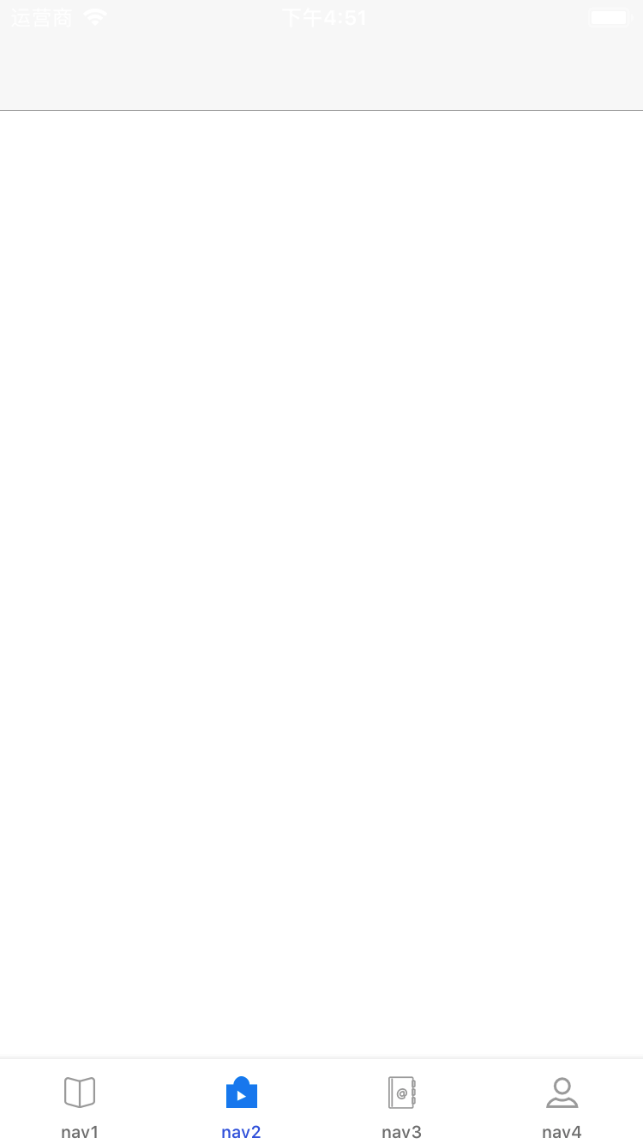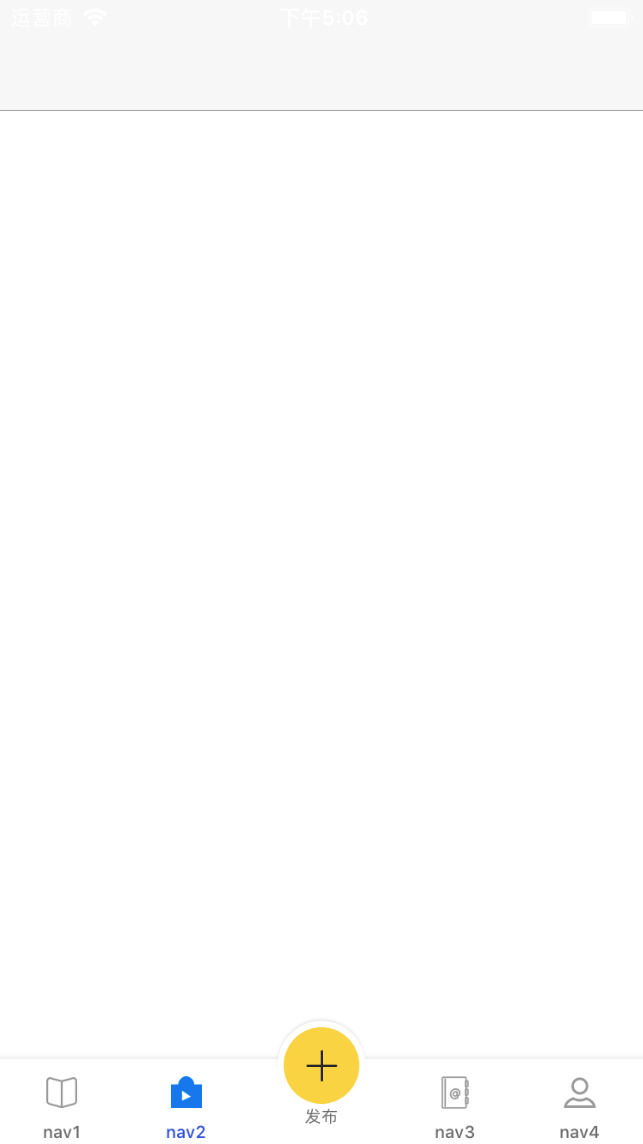用TabbarController进行模块分类和管理,这里推荐一个CYLTabBarController,只需两个数组就可以使用和管理;
使用cocoapods导入即可 pod 'CYLTabBarController', '~> 1.14.1',终端 pod install 即可
新建一个基于 NSObject 类 MainTabBarControllerConfig,用于配置CYLTabBarController及管理;头文件引入
#import <CYLTabBarController.h>
.h
@interface MainTabBarControllerConfig : NSObject
///CYLTabBarController @property (nonatomic,strong) CYLTabBarController *mainTabBarController; @end
.m
logs_code_copy">
@implementation MainTabBarControllerConfig
- (CYLTabBarController *)mainTabBarController{
if (!_mainTabBarController) {
UIEdgeInsets imageInsets = UIEdgeInsetsZero;
UIOffset titlePositionAdjustment = UIOffsetZero;
_mainTabBarController = [CYLTabBarController tabBarControllerWithViewControllers:[self arrayViewControllerItem] tabBarItemsAttributes:[self arrayAttributesItem] imageInsets:imageInsets titlePositionAdjustment:titlePositionAdjustment];
[self customizeTabBarAppearance:_mainTabBarController];
}
return _mainTabBarController;
}
- (NSArray *)arrayViewControllerItem{
BookcaseNavViewController *bookcaseNavi = [wkj_getSboardBookcase instantiateViewControllerWithIdentifier:@"BookcaseNavViewController"];
AskKaoLaNavViewController *askKlNavi = [wkj_getSboardAskKaoLa instantiateViewControllerWithIdentifier:@"AskKaoLaNavViewController"];
DiscoverNavViewController *discoverNavi = [wkj_getSboardDiscover instantiateViewControllerWithIdentifier:@"DiscoverNavViewController"];
UserNavViewController *userNavi = [wkj_getSboardUser instantiateViewControllerWithIdentifier:@"UserNavViewController"];
///返回需要加载的模块
return @[bookcaseNavi,discoverNavi,askKlNavi,userNavi];
}
- (NSArray *)arrayAttributesItem{
NSDictionary *bookcaseItemsAttributes =@{CYLTabBarItemTitle : @"nav1",
CYLTabBarItemImage : @"bar_tk_01",
/* NSString and UIImage are supported*/
CYLTabBarItemSelectedImage : @"bar_tk_02",};
NSDictionary *discoverItemsAttributes = @{CYLTabBarItemTitle : @"nav2",
CYLTabBarItemImage : @"bar_kc_01",
CYLTabBarItemSelectedImage : @"bar_kc_02",};
NSDictionary *askklItemsAttributes = @{CYLTabBarItemTitle : @"nav3",
CYLTabBarItemImage : @"bar_dzs_01",
CYLTabBarItemSelectedImage : @"bar_dzs_02",};
NSDictionary *userItemsAttributes = @{CYLTabBarItemTitle : @"nav4",
CYLTabBarItemImage : @"bar_wd_01",
CYLTabBarItemSelectedImage : @"bar_wd_02"};
NSArray *tabBarItemsAttributes = @[bookcaseItemsAttributes,
discoverItemsAttributes,
askklItemsAttributes,
userItemsAttributes];
return tabBarItemsAttributes;
}
/**
* 更多TabBar自定义设置:比如:tabBarItem 的选中和不选中文字和背景图片属性、tabbar 背景图片属性等等
*/
- (void)customizeTabBarAppearance:(CYLTabBarController *)tabBarController {
// Customize UITabBar height
// 自定义 TabBar 高度
// tabBarController.tabBarHeight = CYLTabBarControllerHeight;
// set the text color for unselected state
// 普通状态下的文字属性
NSMutableDictionary *normalAttrs = [NSMutableDictionary dictionary];
normalAttrs[NSForegroundColorAttributeName] = [UIColor grayColor];
// set the text color for selected state
// 选中状态下的文字属性
NSMutableDictionary *selectedAttrs = [NSMutableDictionary dictionary];
selectedAttrs[NSForegroundColorAttributeName] = Wonderful_BlueColor6;
// set the text Attributes
// 设置文字属性
UITabBarItem *tabBar = [UITabBarItem appearance];
[tabBar setTitleTextAttributes:normalAttrs forState:UIControlStateNormal];
[tabBar setTitleTextAttributes:selectedAttrs forState:UIControlStateSelected];
// Set the dark color to selected tab (the dimmed background)
// TabBarItem选中后的背景颜色
// [self customizeTabBarSelectionIndicatorImage];
// update TabBar when TabBarItem width did update
// If your app need support UIDeviceOrientationLandscapeLeft or UIDeviceOrientationLandscapeRight,
// remove the comment '//'
// 如果你的App需要支持横竖屏,请使用该方法移除注释 '//'
// [self updateTabBarCustomizationWhenTabBarItemWidthDidUpdate];
// set the bar shadow image
// This shadow image attribute is ignored if the tab bar does not also have a custom background image.So at least set somthing.
[[UITabBar appearance] setBackgroundImage:[[UIImage alloc] init]];
[[UITabBar appearance] setBackgroundColor:[UIColor whiteColor]];
[[UITabBar appearance] setShadowImage:[UIImage imageNamed:@"tapbar_top_line"]];
// set the bar background image
// 设置背景图片
// UITabBar *tabBarAppearance = [UITabBar appearance];
// [tabBarAppearance setBackgroundImage:[UIImage imageNamed:@"tab_bar"]];
// remove the bar system shadow image
// 去除 TabBar 自带的顶部阴影
// [[UITabBar appearance] setShadowImage:[[UIImage alloc] init]];
}

在AppDelegate.m didFinishLaunchingWithOptions:(NSDictionary *)launchOptions 方法中

- (BOOL)application:(UIApplication *)application didFinishLaunchingWithOptions:(NSDictionary *)launchOptions {
// Override point for customization after application launch.
// /加载中间自定义按钮
// [TabbarPlusButton registerPlusButton];
MainTabBarControllerConfig *tabbarConfig = [[MainTabBarControllerConfig alloc]init];
CYLTabBarController *mainTabbarController = tabbarConfig.mainTabBarController;
[self.window setRootViewController:mainTabbarController];
return YES;
}


加入中间按钮之前,确保上面的功能已经实现;新建一个基于 CYLPlusButton 的类 TabbarPlusButton,实现代理 CYLPlusButtonSubclassing
.h
@interface TabbarPlusButton : CYLPlusButton<CYLPlusButtonSubclassing> @end
.m

@implementation TabbarPlusButton - (instancetype)initWithFrame:(CGRect)frame { if (self = [super initWithFrame:frame]) { self.titleLabel.textAlignment = NSTextAlignmentCenter; self.adjustsImageWhenHighlighted = NO; } return self; } //上下结构的 button - (void)layoutSubviews { [super layoutSubviews]; // 控件大小,间距大小 // 注意:一定要根据项目中的图片去调整下面的0.7和0.9,Demo之所以这么设置,因为demo中的 plusButton 的 icon 不是正方形。 CGFloat const imageViewEdgeWidth = self.bounds.size.width * 0.7; CGFloat const imageViewEdgeHeight = imageViewEdgeWidth * 0.9; CGFloat const centerOfView = self.bounds.size.width * 0.5; CGFloat const labelLineHeight = self.titleLabel.font.lineHeight; CGFloat const verticalMargin = (self.bounds.size.height - labelLineHeight - imageViewEdgeHeight) * 0.5; // imageView 和 titleLabel 中心的 Y 值 CGFloat const centerOfImageView = verticalMargin + imageViewEdgeHeight * 0.5; CGFloat const centerOfTitleLabel = imageViewEdgeHeight + verticalMargin * 2 + labelLineHeight * 0.5 + 5; //imageView position 位置 self.imageView.bounds = CGRectMake(0, 0, imageViewEdgeWidth, imageViewEdgeHeight); self.imageView.center = CGPointMake(centerOfView, centerOfImageView); //title position 位置 self.titleLabel.bounds = CGRectMake(0, 0, self.bounds.size.width, labelLineHeight); self.titleLabel.center = CGPointMake(centerOfView, centerOfTitleLabel); } #pragma mark - #pragma mark - CYLPlusButtonSubclassing Methods /* * Create a custom UIButton with title and add it to the center of our tab bar * */ + (id)plusButton { TabbarPlusButton *button = [[TabbarPlusButton alloc] init];
///中间按钮图片 UIImage *buttonImage = [UIImage imageNamed:@"post_normal"]; [button setImage:buttonImage forState:UIControlStateNormal]; [button setTitle:@"发布" forState:UIControlStateNormal]; [button setTitleColor:[UIColor grayColor] forState:UIControlStateNormal]; [button setTitle:@"发布" forState:UIControlStateSelected]; [button setTitleColor:[UIColor blueColor] forState:UIControlStateSelected]; button.titleLabel.font = [UIFont systemFontOfSize:9.5]; [button sizeToFit]; // or set frame in this way `button.frame = CGRectMake(0.0, 0.0, 250, 100);` // button.frame = CGRectMake(0.0, 0.0, 250, 100); // button.backgroundColor = [UIColor redColor]; // if you use `+plusChildViewController` , do not addTarget to plusButton. [button addTarget:button action:@selector(clickPublish) forControlEvents:UIControlEventTouchUpInside]; return button; } /* * Create a custom UIButton without title and add it to the center of our tab bar * */ //+ (id)plusButton //{ // // UIImage *buttonImage = [UIImage imageNamed:@"hood.png"]; // UIImage *highlightImage = [UIImage imageNamed:@"hood-selected.png"]; // // CYLPlusButtonSubclass* button = [CYLPlusButtonSubclass buttonWithType:UIButtonTypeCustom]; // // button.autoresizingMask = UIViewAutoresizingFlexibleRightMargin | UIViewAutoresizingFlexibleLeftMargin | UIViewAutoresizingFlexibleBottomMargin | UIViewAutoresizingFlexibleTopMargin; // button.frame = CGRectMake(0.0, 0.0, buttonImage.size.width, buttonImage.size.height); // [button setBackgroundImage:buttonImage forState:UIControlStateNormal]; // [button setBackgroundImage:highlightImage forState:UIControlStateHighlighted]; // [button addTarget:button action:@selector(clickPublish) forControlEvents:UIControlEventTouchUpInside]; // // return button; //} #pragma mark - #pragma mark - Event Response - (void)clickPublish { CYLTabBarController *tabBarController = [self cyl_tabBarController]; UIViewController *viewController = tabBarController.selectedViewController; UIActionSheet *actionSheet = [[UIActionSheet alloc] initWithTitle:nil delegate:nil cancelButtonTitle:@"取消" destructiveButtonTitle:nil otherButtonTitles:@"拍照", @"从相册选取", @"淘宝一键转卖", nil]; [actionSheet showInView:viewController.view]; } #pragma mark - UIActionSheetDelegate - (void)actionSheet:(UIActionSheet *)actionSheet didDismissWithButtonIndex:(NSInteger)buttonIndex { NSLog(@"buttonIndex = %@", @(buttonIndex)); } #pragma mark - CYLPlusButtonSubclassing //+ (UIViewController *)plusChildViewController { // UIViewController *plusChildViewController = [[UIViewController alloc] init]; // plusChildViewController.view.backgroundColor = [UIColor redColor]; // plusChildViewController.navigationItem.title = @"PlusChildViewController"; // UIViewController *plusChildNavigationController = [[UINavigationController alloc] // initWithRootViewController:plusChildViewController]; // return plusChildNavigationController; //} // //+ (NSUInteger)indexOfPlusButtonInTabBar { // return 4; //} // //+ (BOOL)shouldSelectPlusChildViewController { // BOOL isSelected = CYLExternPlusButton.selected; // if (isSelected) { // NSLog(@"??类名与方法名:%@(在第%@行),描述:%@", @(__PRETTY_FUNCTION__), @(__LINE__), @"PlusButton is selected"); // } else { // NSLog(@"??类名与方法名:%@(在第%@行),描述:%@", @(__PRETTY_FUNCTION__), @(__LINE__), @"PlusButton is not selected"); // } // return YES; //} + (CGFloat)multiplierOfTabBarHeight:(CGFloat)tabBarHeight { return 0.3; } + (CGFloat)constantOfPlusButtonCenterYOffsetForTabBarHeight:(CGFloat)tabBarHeight { return -10; } @end

最后在AppDelegate.m didFinishLaunchingWithOptions:(NSDictionary *)launchOptions 方法中加上 [TabbarPlusButton registerPlusButton] 即可;

- (BOOL)application:(UIApplication *)application didFinishLaunchingWithOptions:(NSDictionary *)launchOptions {
// Override point for customization after application launch.
// /加载中间自定义按钮
[TabbarPlusButton registerPlusButton];
MainTabBarControllerConfig *tabbarConfig = [[MainTabBarControllerConfig alloc]init];
CYLTabBarController *mainTabbarController = tabbarConfig.mainTabBarController;
[self.window setRootViewController:mainTabbarController];
return YES;
}

